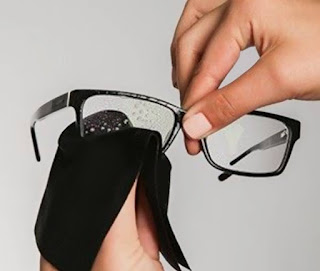 |
| Hold glasses by the bridge to clean |
2) Develop the habit of handling glasses by gripping them at the bridge (over your nose).
3) Never use paper or unknown synthetic fabrics to clean or dry glasses.
4) Develop the habit of wiping glasses from the outside toward the bridge to avoid spreading oils and dust particles trapped in the oils that are generally most concentrated near the bridge.
5) Don't clean glasses "when they need it" or you will over-clean them, creating micro-scratches that will make your glasses always seem dirty anytime they aren't wet.
6) Routine cleaning should be done with warm water and only the smallest amount of detergent necessary to prevent water spots. More detergent can be used if necessary, but rinse them later. Do not rinse glasses with water that does not have a small amount of detergent or the water will leave mineral deposits that can cloud and scratch glasses. Whenever possible, let glasses air dry rather than drying them with a cloth.
7) When you MUST clean glasses outside of your routine, use a moist towelette specifically designed for cleaning glasses.
8) Never use a dry cloth to clean glasses, not even a micro-fiber cloth, however, a dry micro-fiber cloth that is only used to dry clean glasses is an excellent choice for drying glasses after washing them when air-drying is not possible.
9) When you clean your glasses, pay attention to their state of repair. Tighten loose screws and make sure the glasses are still not making contact with skin or eyelashes while in normal use.
10) Some people recommend only keeping glasses in a glasses case, but it is my opinion that glasses don't last as long if they are regularly folded and unfolded. Nevertheless, it is important to only lay glasses in a place created for them where they are protected and where they will not be exposed to dust. A small tray with a cloth laid over them would be a good choice. So would a wooden box with a hinged lid that is large enough to hold them unfolded.
No comments:
Post a Comment